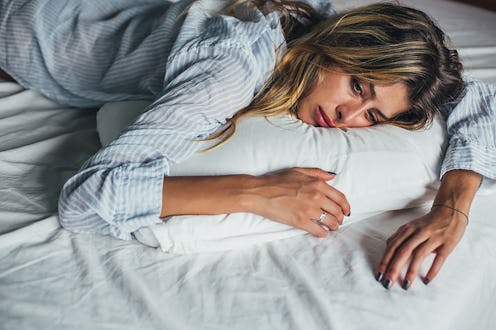Life
Science Says Your Post-Sesh Fear Is Actually Totally Legit & Here's Why

Most of us have been there. You get invited out for one festive drink or the work Christmas party and things escalate. You end the night a little bit more than merry, in an uber with your chips and gravy, trying to remember your address. You wake up in the morning, fully clothed in last night's outfit with a pounding headache, club stamp that will be imprinted on your hand for days, and the sinking feeling that something isn’t quite right. Did you do something wrong? This feeling of dread has a name: The Fear. So what is The Fear after a night out and what causes the feeling of dread? Even when you’re fairly sure you refrained from texting an ex, telling your boss how tragic your love life is, or being sick, it is hard to shake the nervy feeling in your stomach.
Urban Dictionary describes The Fear as the “sense that you have done yourself some lasting damage after a night of drinking.” And some of the symptoms include “a feeling that you are going to die soon” and “angst that you may have offended, inappropriately touched, or physically attacked someone the night before.” Sound at all familiar?
Well, if it’s on Urban Dictionary it must be legit and it turns out The Fear is a very real symptom of drinking alcohol. Many of us are aware that a bit of a sore head and off tummy might follow a hard session of Christmas drinks but not the effects it may have on our mental state. Speaking on the Drink Aware website, Eva Cyhlarova from The Mental Health Foundation explained that as alcohol is a depressant it can leave drinkers struggling to process stress. She said, "Over time, heavy drinking interferes with the neurotransmitters in the brain that are needed for good mental health. So while alcohol may help deal with stress in the short term, in the long run it can contribute to feeling of depression and anxiety and make stress harder to deal with.”
Well that would explain the feeling of impending doom. Women’s Health has looked further into the science behind The Fear. Speaking to psychiatrist Dr Apara Iyer about what actually happens to us when we are experiencing the fear she said, “alcohol mimics the effects of GABA, a neurotransmitter that helps people feel less inhibited, which is why you might feel extra chilled and gregarious while you’re drinking. But during the hangover the next day, the effects are reversed, causing anxiety to spike.” She added that the same is seen with the happiness hormone serotonin.
So, whilst your behaviour the night before may warrant the “oh dear god what did I do last night?” text to your friends, The Fear is also a symptom of your body processing the alcohol withdrawal from the night before. The million dollar question is, how can you avoid the fear all together?
The obvious answer is don’t drink, but I get it — many peoples social lives revolve around drinking and to quit at this time of the year when there seems to be Christmas parties, pub trips, and events most nights of the week, is extremely difficult. Drink Aware offers some great practical tips in dealing with hangovers and the dreaded fear. It says “keep yourself hydrated with plenty of non-alcohlic drinks and avoid caffeine. Try to eat regularly.” Additionally, the Calm Clinic suggests that until you’re feeling a little better you should avoid situations that will make you feel more stressed, say sorry if you remember doing something wrong, and plan ahead next time to give yourself a limit on the number of drinks you can have.